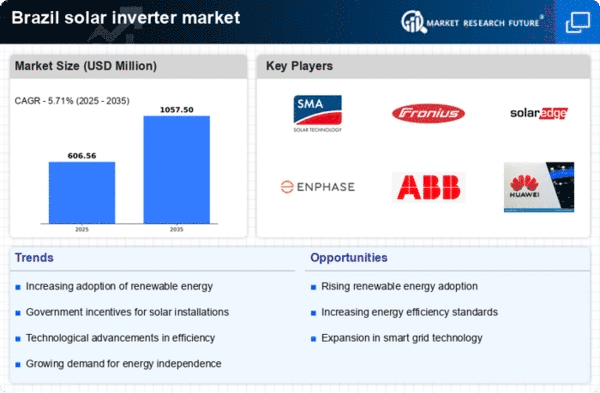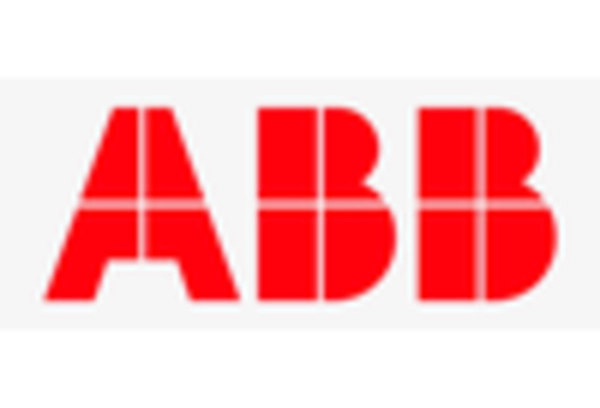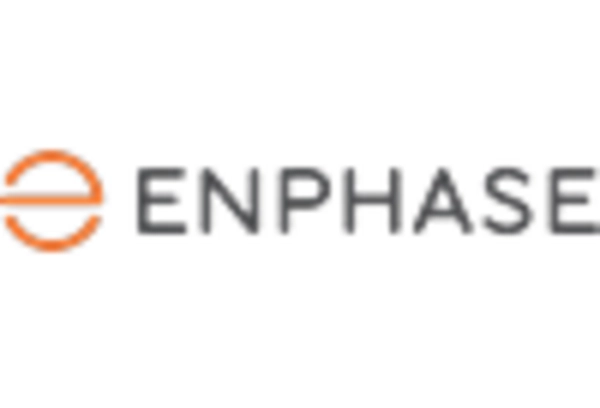Rising Energy Demand
The increasing energy demand in Brazil is a pivotal driver for the solar inverter market. As urbanization accelerates and the population grows, the need for reliable and sustainable energy sources intensifies. In 2025, Brazil's energy consumption is projected to rise by approximately 3.5% annually, necessitating innovative solutions to meet this demand. Solar inverters play a crucial role in converting solar energy into usable electricity, thereby supporting the transition to renewable energy. This shift is further encouraged by Brazil's commitment to reducing greenhouse gas emissions, which aligns with the global trend towards sustainability. Consequently, The solar inverter market is likely to grow as more consumers and businesses seek to harness solar energy.
Technological Innovations
Technological advancements in solar inverter technology are driving the evolution of the solar inverter market in Brazil. Innovations such as smart inverters, which offer enhanced monitoring and control capabilities, are becoming increasingly prevalent. These devices can optimize energy production and improve system reliability, making solar energy more attractive to consumers. In 2025, the market is witnessing a shift towards more efficient inverter solutions, with efficiency ratings exceeding 98%. This trend is likely to continue as manufacturers invest in research and development to enhance product performance. The integration of artificial intelligence and machine learning in inverter technology also presents opportunities for improved energy management, further propelling the growth of the solar inverter market.
Favorable Regulatory Environment
Brazil's regulatory framework is increasingly supportive of renewable energy initiatives, which significantly impacts the solar inverter market. The government has implemented various policies aimed at promoting solar energy adoption, including tax incentives and streamlined permitting processes. For instance, the introduction of net metering regulations allows consumers to receive credits for excess energy produced, enhancing the economic viability of solar installations. As of 2025, it is estimated that over 1.5 million residential solar systems have been installed, largely due to these favorable regulations. This conducive environment not only encourages investment in solar technology but also fosters competition among manufacturers, leading to advancements in inverter technology and efficiency.
Consumer Shift Towards Sustainability
There is a notable shift among Brazilian consumers towards sustainable energy solutions, which is a key driver for the solar inverter market. As awareness of climate change and environmental issues grows, more individuals and businesses are seeking to reduce their carbon footprint. In 2025, surveys indicate that over 60% of consumers express a preference for renewable energy sources, with solar power being a leading choice. This consumer behavior is prompting manufacturers to innovate and offer more efficient and cost-effective solar inverter solutions. Additionally, the rise of eco-conscious brands and corporate sustainability initiatives further fuels this trend, creating a robust market for solar inverters as consumers increasingly prioritize sustainability in their energy choices.
Increasing Investment in Renewable Energy
Investment in renewable energy projects in Brazil is on the rise, significantly influencing the solar inverter market. In 2025, total investments in solar energy are projected to reach approximately $10 billion, reflecting a growing recognition of the economic and environmental benefits of solar power. This influx of capital is expected to drive the installation of solar systems, thereby increasing the demand for solar inverters. Furthermore, as financial institutions and investors become more aware of the long-term returns associated with renewable energy, the market is likely to attract even more funding. This trend not only supports the growth of the solar inverter market but also contributes to Brazil's overall energy transition.
















